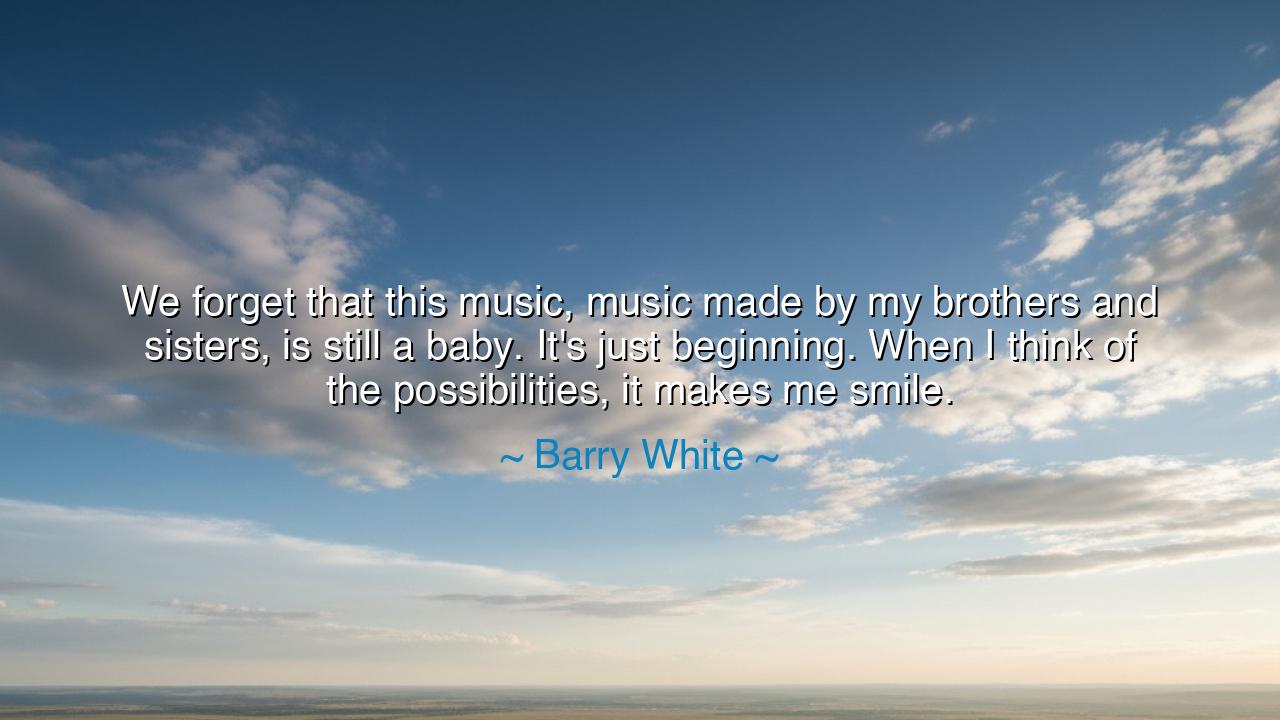
We forget that this music, music made by my brothers and sisters
We forget that this music, music made by my brothers and sisters, is still a baby. It's just beginning. When I think of the possibilities, it makes me smile.






Hear the soulful words of Barry White, the maestro of love’s anthems, who declared with both wonder and pride: “We forget that this music, music made by my brothers and sisters, is still a baby. It’s just beginning. When I think of the possibilities, it makes me smile.” These words, though clothed in the cadence of rhythm and song, speak of far more than melody. They remind us that the creations of a people, born of struggle and hope, are living things—young, growing, destined for greatness. What we see as complete is but the beginning; what we hear as full is but the overture.
The origin of this wisdom lies in the story of African American music—gospel, blues, jazz, soul, R&B—songs born from sorrow, faith, labor, and joy. From the fields where enslaved voices sang spirituals to sustain their spirits, to the smoky clubs of Harlem, to the recording studios where soul and funk set fire to the world, this music was created by Barry White’s “brothers and sisters.” He calls it a baby, not because it is weak, but because it is young compared to the ancient traditions of other cultures. It has only just begun to unfold its wings, yet already it has transformed the globe.
History shows us how young art forms, dismissed at their birth, grow into pillars of civilization. In the days of ancient Greece, the plays of Aeschylus and Sophocles were once new experiments in storytelling, unrefined in the eyes of their critics. Yet those same plays became the foundation of Western drama. So too with the blues and soul: once cast aside as “low” or “common,” they became the bedrock of global popular music. Barry White, in his vision, saw the same destiny—that what was then still growing would one day stand as immortal as the epics of old.
The smile he speaks of is not only joy but hope. To look upon something young and see its boundless potential is to taste the sweetness of the future. Just as a parent smiles at their child, not because the child has already achieved greatness but because greatness lies ahead, so Barry White smiled at the music of his people. He foresaw its power to inspire, to heal, to bring nations together, to carry forward the voices of those long silenced.
This truth is echoed in the life of Louis Armstrong, who, with his trumpet and his gravelly voice, turned the new form of jazz into a universal language. At the time, jazz was dismissed as noisy, even immoral. Yet Armstrong’s joy, his smile in every note, revealed its depth. Like Barry White’s vision, Armstrong showed that this “baby” of music was not a passing fad but a force that would grow, spread, and endure.
The lesson for us is this: do not dismiss what is new, fragile, or unformed. Every great movement, every mighty tradition, was once a child, uncertain in its first steps. Just as music born of suffering and joy could rise to captivate the earth, so too can our own creations, if nurtured with patience and belief. When we see beginnings, we must not sneer; we must smile, for within them lies the seed of transformation.
Practical action must follow. Support the new, the young, the untested. Whether it is a new art form, a new idea, or the first steps of your own dream, tend it with care. Do not measure it by its size today, but by the possibilities it holds for tomorrow. Let your smile be the sign of your faith, just as Barry White smiled at the future of his people’s music. For in every beginning lies the power to change the world.
Thus the teaching is sealed: greatness is not only in the glory of the past, but in the promise of the present. The songs of Barry White’s brothers and sisters were still a baby, yet he saw in them the majesty of ages to come. So too must we look upon our own lives, our own creations, and the creations of others—not with doubt, but with reverence for what they may become. And when we think of the possibilities, may we, too, smile.






AAdministratorAdministrator
Welcome, honored guests. Please leave a comment, we will respond soon